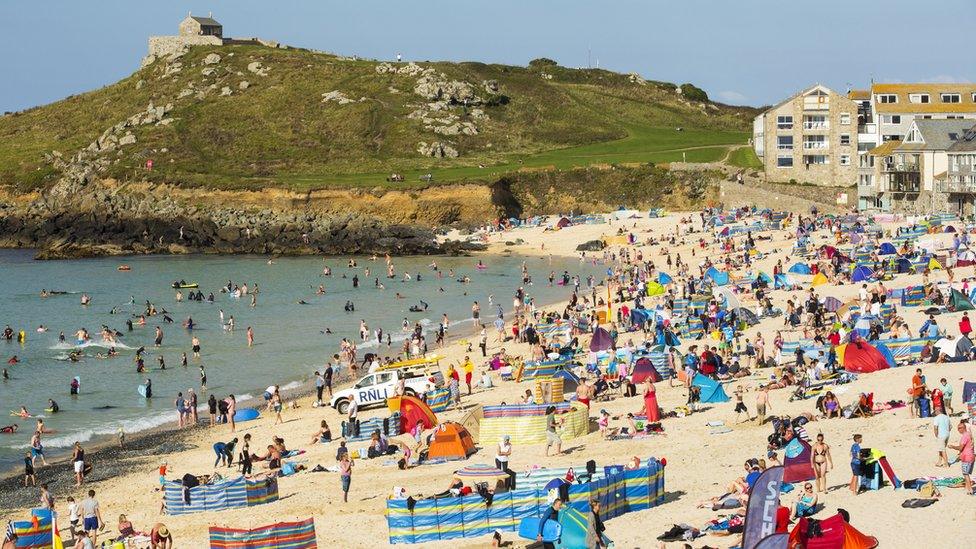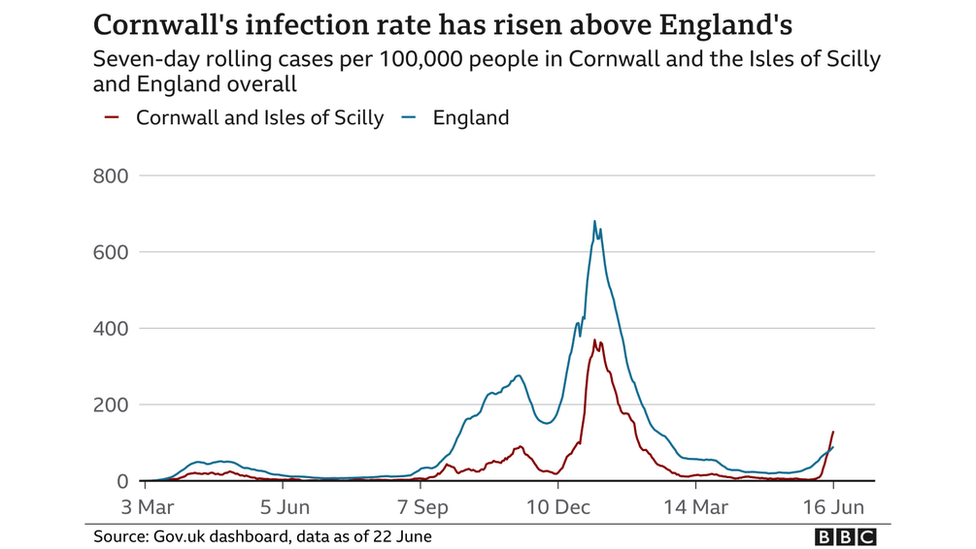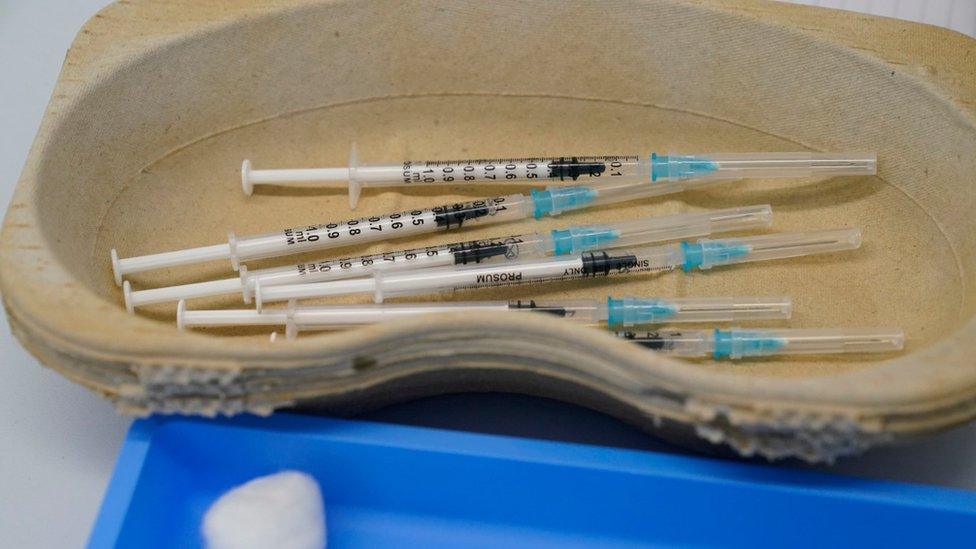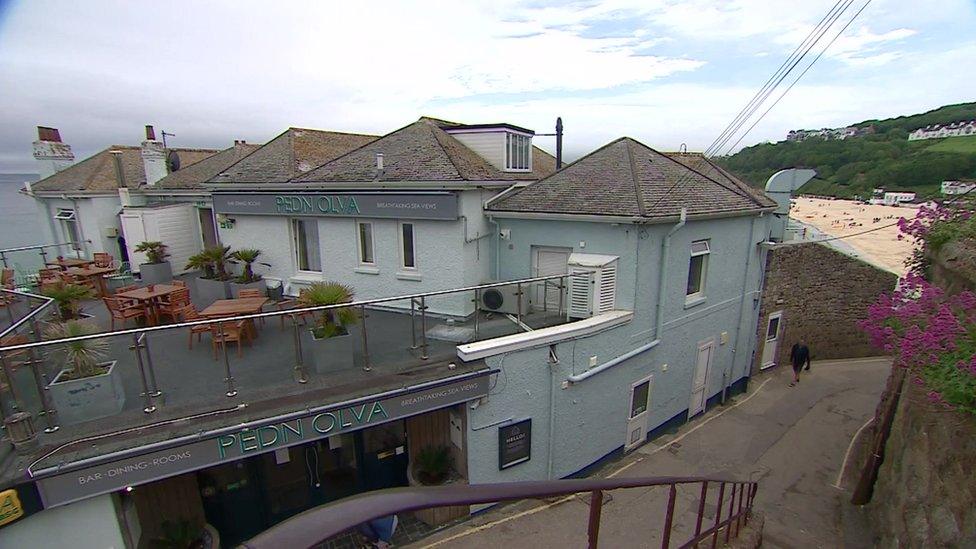Covid cases in Cornwall above national average for first time
- Published

The May lifting of restrictions, the G7 summit and half-term holidays have all come under scrutiny
Covid rates in Cornwall have risen above the England average for the first time since the beginning of the pandemic.
Business leaders and academics are calling for surge testing in the county.
It comes as one academic says the G7 summit made a "massive contribution" to the jump in cases.
Cornwall Council and the government point to the Delta variant for the rise.

For the first time in the pandemic, Cornwall is experiencing higher levels of coronavirus than England overall.
The rate of cases per 100,000 in Cornwall is 131, compared to 90 for England in the week to Wednesday, with three people in the county's hospital with the virus.
The latest government figures suggest infection levels in Cornwall have surpassed the overall rate for England for the first time since wider testing became available on 18 May 2020.
Dr Zubaida Haque, who sits on Independent SAGE, a self-appointed shadow group of the government's scientific advisory group, said residents in Cornwall needed protecting.
She said: "The government needs to act fast, local public health officials need to act fast, we need surge testing, we perhaps need more vaccinations in those areas but they need to stop being in denial, start taking responsibility and start acting in the interests of Cornwall residents, businesses and schools."
Dr Haque said it was "astonishing" the G7 summit took place in Cornwall and had a massive contribution in the increase in cases.
But Cornwall Council said there was "no evidence to connect the rise in case numbers to the G7 summit".
A spokesperson said: "Covid-19 case numbers are rising in Cornwall - as they are across the country - due to the new and more transmissible Delta variant, which is spreading more readily among unvaccinated people in the 16-29 age range."

Analysis by Rob England, BBC England Data Unit
For the first time in the pandemic, Cornwall is experiencing higher levels of coronavirus than England overall.
Over the last year and a half, the county has seen consistently low numbers of cases compared with elsewhere, as with many other parts of the South West.
So, although other places are being hit harder by coronavirus, this is still an exceptional situation.
As with the current national hotspots like Blackburn with Darwen, cases in Cornwall are firmly concentrated in people aged 15-29 - those who have largely not been vaccinated yet.
No spread of the virus is good, but on the positive side the data suggests vaccines are protecting older people, who are more likely to become seriously ill after being infected.
However, experts say the Delta variant does carry with it a higher chance of hospitalisation which adds to other potential negative outcomes for patients, such as long Covid.
As it stands though, Cornwall has a slightly higher than average uptake in the vaccine overall.
This may put the area in a better position to guard against a new wave of hospital admissions.

The government also said it was not aware of any transmission from delegates to local residents.
In the week to Wednesday there were 747 cases in Cornwall; 79 in areas around St Ives and nearly 200 in Falmouth where the G7 media centre was.
Kim Conchie, from Cornwall Chamber of Commerce, said while it would be disingenuous to say the G7 had no impact he blamed the rise in cases on the increased number of tourists.

Cornwall has a slightly higher than average uptake in the vaccine overall
He added: "I would like to see a combination of surge testing... I'd like to see some idea of perhaps more vaccinations coming to holiday areas like Cornwall so we can get all our adults vaccinated in advance of the 19 July date."
Cherilyn Mackrory, MP for Truro and Falmouth, accused those blaming the G7 summit of "scaremongering".
Ms Mackrory said on Facebook: "Despite assumptions and scaremongering circulating on social media, Cornwall Council's Public Health Chief, Dr Ruth Goldstein, has today confirmed that she 'cannot find a direct, definitive link to G7' in the rise of Covid cases in Cornwall."
Rachel Wigglesworth, director of public health for Cornwall and the Isles of Scilly, said cases had been rising since restrictions were eased on 17 May and then over half-term, with 18 to 30-year-olds particularly affected.
She said proactive testing prior to the G7 summit and an outbreak at a university contributed to the numbers as well as the ease of transmission of the Delta variant.
She also rejected any link to G7 and the rise in Cornwall cases, saying delegates, their entourages, police, caterers and other participants had all been tested.
"There is no evidence of a G7 legacy through Covid," she said, adding that "being honest in public is the most important weapon against Covid".
Councillor Andrew Virr, portfolio holder responsible for public health, said claims there was a cover-up were a "distraction away from the really important public health message" of vaccinations, distancing and following guidelines.

Follow BBC News South West on Twitter, external, Facebook, external and Instagram, external. Send your story ideas to spotlight@bbc.co.uk, external.
- Published17 June 2021

- Published15 June 2021

- Published13 June 2021

- Published11 June 2021
